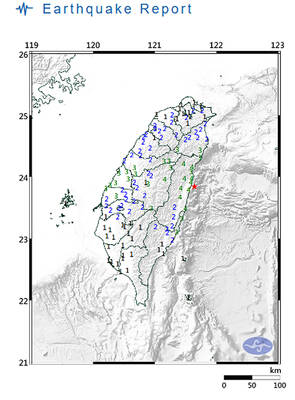While Taipei has maintained formal diplomatic ties with 23 allies following President Ma Ying-jeou’s (馬英九) declaration of a “diplomatic truce” with China, academics and officials say that relations with Nicaragua, Paraguay, Dominica, Panama, Haiti and Honduras have been on shaky ground, cables released by WikiLeaks on Aug. 30 showed.
A cable dated June 2, 2008, issued by the US consulate in Shanghai, quoted Yang Jiemian (楊潔勉), then-president of the Shanghai Institute for International Studies, and its vice president Chen -Dongxiao (陳東曉) as saying that Nicaragua intended to recognize China, but Beijing decided not act on the requests.
The cable said the Chinese academics viewed Beijing’s refusal to accept Nicaragua as an act of “good will” toward Taiwan and that China was awaiting “gestures from Taiwan in the next two months or so.”
“China decided not to implement that offered change, at least for now, to see whether an understanding can be reached that would allow a cessation to the war between Taipei and Beijing for diplomatic recognition,” the cable reads.
Another cable dated March 20, 2009, quoted then-foreign minister Francisco Ou (歐鴻鍊) as telling American Institute in Taiwan (AIT) Chairman Raymond Bughardt that China has refused to accept requests from Paraguay, the Dominican Republic and Panama to switch diplomatic ties.
“Beijing had tacitly accepted Taiwan’s diplomatic truce,” Ou was quoted as saying in the cable.
Ou said he had issued no instructions on the subject as Taipei was still “observing … [but] personally, I hope our diplomats would interpret the ceasefire in a broader way,” the cable said.
Kung Kuo-wei (宮國威), an associate professor at Tamkang University, told the AIT that Paraguay, Panama, Haiti and Honduras had a strong interest in strengthening ties with China and were keen on switching their diplomatic recognition, according to a cable originating from the AIT on Oct. 3, 2008.
Separately, a cable from the US embassy in Beijing on Jan. 16, 2009, quoted Renmin University professor Jin Canrong (金燦榮) as saying that five unnamed countries with diplomatic relations with Taiwan were willing to switch their recognition to China
As for the South Pacific region, a cable dated Sept. 25, 2008, from the AIT showed that six of Taiwan’s diplomatic allies — Kiribati, Marshall Islands, Nauru, Palau, the Solomon Islands and Tuvalu — were uneasy about their ties with Taiwan following the “diplomatic truce” policy.
The cable quoted Victor Yu (于德勝), then-director general for the Ministry of Foreign Affairs’ Department of East Asian Affairs, as saying that this unease had prompted Taiwan to reassure its Pacific island diplomatic partners that its engagement with China would not change its policy in the region and that it would continue, and probably even increase, development cooperation.

A small number of Taiwanese this year lost their citizenship rights after traveling in China and obtaining a one-time Chinese passport to cross the border into Russia, a source said today. The people signed up through Chinese travel agencies for tours of neighboring Russia with companies claiming they could obtain Russian visas and fast-track border clearance, the source said on condition of anonymity. The travelers were actually issued one-time-use Chinese passports, they said. Taiwanese are prohibited from holding a Chinese passport or household registration. If found to have a Chinese ID, they may lose their resident status under Article 9-1

Taiwanese were praised for their composure after a video filmed by Taiwanese tourists capturing the moment a magnitude 7.5 earthquake struck Japan’s Aomori Prefecture went viral on social media. The video shows a hotel room shaking violently amid Monday’s quake, with objects falling to the ground. Two Taiwanese began filming with their mobile phones, while two others held the sides of a TV to prevent it from falling. When the shaking stopped, the pair calmly took down the TV and laid it flat on a tatami mat, the video shows. The video also captured the group talking about the safety of their companions bathing

PROBLEMATIC APP: Citing more than 1,000 fraud cases, the government is taking the app down for a year, but opposition voices are calling it censorship Chinese Nationalist Party (KMT) Chairwoman Cheng Li-wun (鄭麗文) yesterday decried a government plan to suspend access to Chinese social media platform Xiaohongshu (小紅書) for one year as censorship, while the Presidential Office backed the plan. The Ministry of the Interior on Thursday cited security risks and accusations that the Instagram-like app, known as Rednote in English, had figured in more than 1,700 fraud cases since last year. The company, which has about 3 million users in Taiwan, has not yet responded to requests for comment. “Many people online are already asking ‘How to climb over the firewall to access Xiaohongshu,’” Cheng posted on

A magnitude 5.7 earthquake yesterday struck off the coast of Hualien, causing brief transportation disruptions in northern and eastern Taiwan, as authorities said that aftershocks of magnitude 5 or higher could occur over the next three days. The quake, which hit at 7:24pm at a depth of 24.5km, registered an intensity of 4 in Hualien and Nantou counties, the Central Weather Administration (CWA) said. There were no immediate reports of damage or injuries. In Taipei, the MRT railway’s operations control center received an earthquake alert and initiated standard safety procedures, briefly halting trains on the Bannan (blue) line for about a minute.